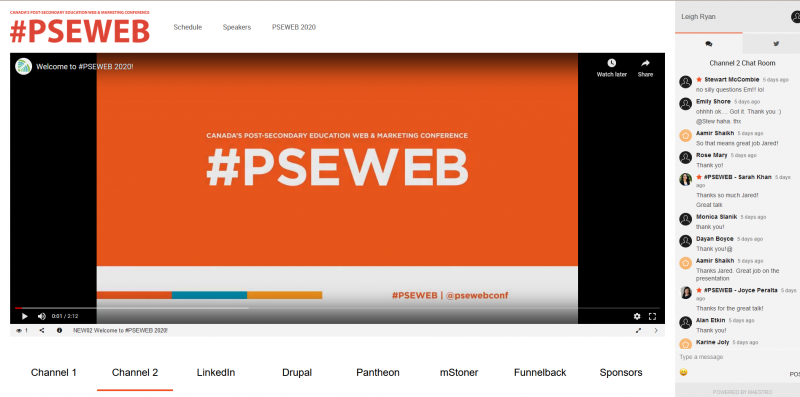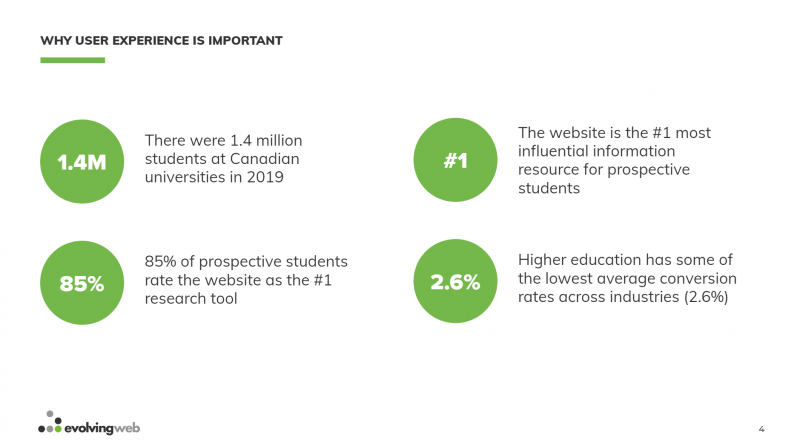Last week I had the opportunity to attend PSEWEB 2020, Canada's annual digital marketing conference for colleges and universities.
While it would have been nice to attend sessions and meet attendees in person (the conference was originally supposed to take place on the McGill campus in Evolving Web's home city of Montreal), it's safe to say that the virtual version of the event was still a success.

The streaming platform worked like a charm, the chat and live Q&A features added depth and dimension to each presentation, and the presenters nailed their sessions despite having to deliver them in front of a screen rather than a live audience.
📚 Join us in October for our free webinar, 5 Keys to Success for Using Drupal in Higher Ed, hosted by Evolving Web co-founder and Drupal Association board member Suzanne Dergacheva.
As a newcomer to the Canadian higher ed space, I really enjoyed the friendly community vibe surrounding the event. Attendees and speakers alike seemed truly eager to share their experiences and help each other work through the industry's unique digital marketing challenges. The only downside was having to choose between two simultaneous sessions — but that's always a dilemma IRL as well.
I've tried to pick out a few highlights among the presentations I did get to attend, but they represent just a fraction of the insights and knowledge that were shared over the two-day event.
Running Successful Large-Scale Campaigns
In her presentation "I've got 99 audiences and I need them to be one — Breaking through the digital noise to reach your people", McGill University's digital strategy director Taylor Valee shared her insights on how to focus your marketing efforts when you're targeting a broad demographic.
Marketers, Vallee says, have a hard time defining specific audiences — especially when it comes to things like large fundraising campaigns, which typically target a broad range of users.
Through the story of McGill24, the university's annual 24-hour fundraiser, Vallee shared a relatable tale of fundraising teams wanting to target everyone, and how communications and marketing departments can help focus those efforts by defining specific audience segments.
So how should you go about defining those audiences? The key, according to Vallee, is to know the numbers. In this case study, the McGill team looked through several years' worth of data and ended up pinpointing four key audiences to target. Then, they used a variety of tactics across multiple channels to reach those audiences where they were and speak to them in an authentic way, with a common goal of inspiring donations.
The question they would ask is a simple but crucial one: "What does this audience want to see, and how do they want to see it?".
The results were clear: audience segmentation pays off. The team's data-driven targeting strategy paved the way for the biggest day of donations in the history of the event.
Not Being Afraid to Start Over
McGill digital design manager Heidi Stroll's presentation focused on how the university redesigned its homepage in 2019... and then redesigned it again, that same year.
The redesign was a pilot project for the university: it was the first of its kind to be carried out collaboratively between multiple departments. The double redesign of 2019 was a lesson in collaboration and stakeholder management, and it also taught teams about the importance of truly understanding the purpose of their work.
The major takeaway: don't fall for the old sunk cost fallacy. If something isn't working, you need to take a step back, understand exactly why things aren't going as expected, and take those insights back to the drawing board.
Creating Content Strategies for Higher Ed
The University of British Columbia's digital marketing strategist, Houston White, gave a fantastic session detailing his experience building a content strategy for UBC. Looking back a year after kicking off the strategy, he shared his insights on what worked and what didn't.
For starters, the content team put together a brand wheel outlining crucial messaging components such as:
- Their functional offering
- Their emotional offering
- Their brand story
- Their frame of reference
This helped them define an overarching message for their marketing efforts as well as identify where they should be telling which stories. They then launched a cross-channel brand campaign whose goal was to bridge the gap between perceptions of the university and the reality of its brand story.
To do this, UBC focused on conveying a unified message but tweaking its delivery depending on the location of its audience. The university needed to take a different approach when targeting local prospective students, who were already aware of the university as an option for their studies, than for out-of-province audiences, for whom UBC was largely unknown. The results of this multifaceted campaign were extremely positive, with significant gains in brand awareness among prospective students in other provinces and a higher level of affinity with the UBC brand among British Columbia locals.
Understanding your users to build better experiences
Evolving Web co-founder Suzanne Dergacheva shared some secrets to building better experiences using techniques from UX research and content strategy. Featuring examples from two higher ed clients we worked with recently, Princeton and McGill, her session outlined various tactics that every higher ed marketer should have in their toolbox.

Attendees were able to see how the Evolving Web team mapped out the steps prospective students typically follow when choosing a school, and learned how to translate those findings into a persuasive, cohesive website experience.
The session also outlined the components of a strong UX practice and explored how to interpret the results of user research. One of the main takeaways was the importance of creating a process around your UX practice and sharing resources and results across campus.
Figuring Out the Smartest Way to Spend a Media Budget
Adriann Kennedy, communications manager for University of Waterloo's faculty of mathematics, shared an inspiring — and humorous! — tale of trial and error in her presentation "Google can't fix everything (or, how we made the most of our ad fails)".
A common thread in many of the sessions I attended was front and centre here: you need to understand the numbers. Kennedy, who works mainly with mathematicians and prospective math students, shared how important data is when it comes to allocating money and resources to marketing and promotion.
Another important lesson learned is that small changes are better than no changes at all. If you're not 100% sure of the direction you're taking, make changes incrementally, then take a step back and measure the impact. Rinse and repeat until you've built a full campaign.
Finally, Kennedy reminded the audience that you're not alone in wanting to improve how you're promoting your story. Find your champions, whether they're students or faculty, and partner with them to tap into a wealth of authentic messaging that's sure to resonate with the people you want to reach.
Top 3 Takeaways
If I had to pick the three key messages I took away from PSEWEB, it'd be these:
- Numbers are crucial, and not all pieces of data are created equal. Collecting, understanding, and utilizing the data at our disposal is a skill that every marketing team needs to focus on constantly improving.
- Understanding your audience means more than just drafting a standard-issue persona. It also means digging deeper into users' wants, needs, behavioural quirks, and mental models in order to match their expectations in the experiences you deliver.
- User-created content is extremely powerful, as long as you have well-defined guidelines and publication criteria in place.
Is Your School's Digital Presence Due for a Redesign?
In addition to speaking and hosting a workshop, our co-founder Suzanne represented Drupal at the conference on behalf of the Drupal Association. Drupal, an open-source CMS, sponsored PSEWEB 2020 as part of its Promote Drupal initiative, which aims to spread the word about Drupal to the wider community. You can learn more about Drupal by joining our free upcoming intro to Drupal webinar. If you're already familiar with the platform and would like to contribute, read about the Promote Drupal initiative.
If you didn't make it to PSEWEB 2020, here's hoping we'll see you there next year! In the meantime, if you need a hand creating high-quality online experiences for your students, prospects, alumni and staff, get in touch with Evolving Web. Our team of Drupal experts specializes in design and development for large institutions like universities and colleges, and we'd love to hear about your next big project.
Top banner image: Arts Building, McGill University, Montréal, photo by DXR / CC BY-SA

